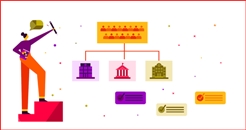 Let's continue to build community - collective intelligence
Let's continue to build community - collective intelligence
From a report by Nesta
More and more institutions have come to recognise that in the 21st century their in-house capacity and knowledge are too limited when compared to the speed, scale and complexity of many public problems. Instead, they look to networks of people inside and outside of government to make decisions and take action more effectively and, because those decisions involve the community, more legitimately.
The experience, expertise and passion of a group of people is what Nesta calls collective intelligence. The Internet decreases the costs of collaboration across a distance and when groups of people work together online, they can mobilise a wider range of information, ideas and insights. When such collaboration results in more than the sum of its parts, that is collective intelligence.
The practice of taking advantage of collective intelligence is sometimes called crowdsourcing, collaboration, co-creation or just engagement. But whatever the name, the report explores the advantages created when institutions mobilise the information, knowledge, skills and capabilities of a distributed group to extend problem solving abilities.
Here are some many benefits to using collective intelligence processes like crowdsourcing, collaboration and co-creation in problem-solving:
-
Getting more hands on deck. When we turn to a larger community of people, we are getting more insights and experiences and more collective wisdom and action faster. The diversity of people and perspectives can be very helpful, as can simply having more people working together to accomplish what is hard for you to do alone.
-
Understanding the root causes of problems. Working with communities can also help institutions to understand the root causes of problems and develop solutions that solve the problems in ways that are most valuable to the people experiencing them.
-
Engaging larger and more diverse audiences. Engaging a larger and more diverse audience in problem-solving can also help to accomplish what institutions cannot do alone.
-
Solving problems in new ways. Collecting insights and data from a broader community also helps institutions to solve problems in new ways.
-
Providing greater accountability. Another function of collective intelligence is to engage a larger audience in providing greater accountability by sharing the work of oversight and evaluation.
-
Strengthening legitimacy of decisions. Including citizens in spending money is helping cities to make decisions that are more legitimate.
Too often leaders do not know how to engage with the public efficiently to solve problems. They may run the occasional crowdsourcing exercise, citizens’ jury or prize-backed challenge, but they struggle to integrate collective intelligence in the regular course of business. Citizen engagement is largely viewed as a nice-to-have rather than a must-have for efficient and effective problem-solving.
Working more openly and collaboratively requires institutions to develop new capabilities, change long-standing procedures, shift organisational cultures, foster conditions more conducive to external partnerships, alter laws and ensure collective intelligence inputs are transparently accounted for when making decisions. But knowing how to make these changes, and how to redesign the way public institutions make decisions, requires a much deeper and more nuanced understanding of when and how to use collective intelligence.
To help institutions meet this challenge, the report identifies successful uses of collective intelligence using interviews with public officials, platform creators and community managers across six continents to gather hard evidence of what does and does not work. The report includes illustrative case studies and different methods and tools.
Access the report here.
See also other blogs here; Participatory Budgeting - 1, CitizenLab.
Retweet about this article:
From a report by Nesta, 19/10/2021